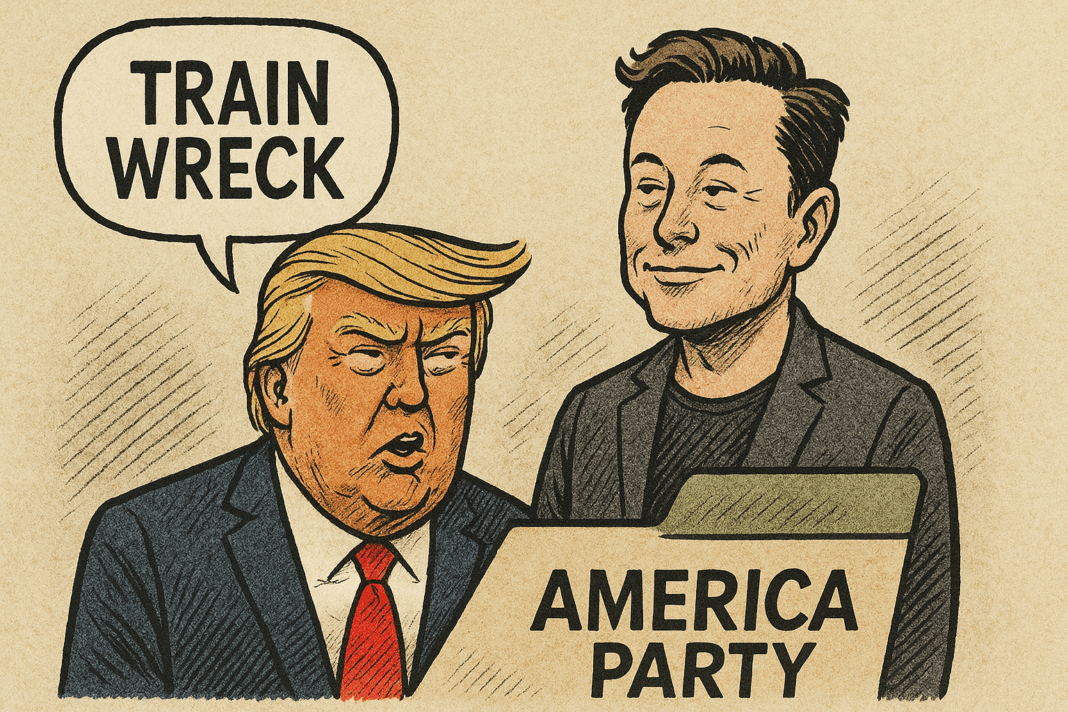- Musk launches “America Party” to disrupt the political status quo.
- Clashes with Trump over immigration deepen their rift.
- Over 65% of Musk’s followers back the party, per X poll.
- Trump calls it “ridiculous” and Musk “off the rails.”
- Democrats hope it splits GOP votes in swing states.
- Eyes now turn to its impact on the 2026 midterms.
What began as a personal falling-out between two billionaires has exploded into a political wildcard for 2026 and 2028. On July 4, Elon Musk formally proposed the creation of the “America Party”—a third-party political movement meant to break up what he described as “a one-party system that bankrupts the country with waste and graft.” The move came just days after a heated public spat with former President Donald Trump over immigration, policy control, and endorsements.
Why Musk Launched the America Party
Musk’s core argument centers on institutional failure. In a series of X posts, he argued that neither Republicans nor Democrats represent the future. “Both parties are corrupt, beholden to special interests, and blind to the power of technology and innovation,” he wrote. Musk says his America Party will focus on restoring free speech, AI governance, and scientific literacy—while opposing both “wokeness” and “authoritarian populism.”
He proposed targeting a few House and Senate seats in 2026, stating: “We can’t beat the machine in one go, but we can jam the gears. The goal is 4 to 5 seats that neither side controls.”
What Sparked the Trump-Musk Feud
The rupture between Musk and Trump escalated when Musk criticized Trump’s proposed “One Big Beautiful Bill”—a sweeping immigration measure that included mass deportation and strict E-Verify requirements. Musk called it “cruel,” “economically disastrous,” and “politically suicidal.”
According to reports, Trump had privately pushed Musk to back the bill on X and offer positive commentary. Musk refused—and instead launched a public tirade against both Republican and Democratic . Trump, in response, lashed out on Truth Social, branding Musk “a train wreck,” “off the rails,” and mocking his “ridiculous” attempt at politics.
Musk’s Prize Giveaways During the 2024 Campaign
In the final stretch of the 2024 election, Elon Musk drew national attention with a bold campaign tactic: daily $1 million giveaways to voters in battleground states. Through his political vehicle, America PAC, Musk launched a program offering massive cash prizes to registered voters who signed a petition supporting First and Second Amendment rights. The initiative targeted swing states like Pennsylvania, Georgia, Wisconsin, Michigan, Arizona, Nevada, and North Carolina. (Reuters)
The initiative drew legal scrutiny in Pennsylvania, where state officials questioned whether the program violated election laws. A judge allowed it to proceed after organizers clarified that winners were being selected as “petition spokespeople,” not through a traditional lottery.
One widely reported winner was a Michigan man affiliated with the Trump campaign, who received a $1 million payout on live stream. The Department of Justice later issued a cautionary statement, warning that such giveaways could constitute illegal inducement if tied to voting behavior.
Musk expanded the same model during the 2025 Wisconsin Supreme Court race, offering $100 per petition signature and promising more million-dollar awards. The program triggered a formal lawsuit from Wisconsin’s Elections Commission, which alleged the initiative amounted to “cash-for-influence.”
While the true impact of Musk’s giveaways on voter turnout remains debated, there is no question that his financial muscle reshaped the electoral landscape—and sparked ongoing legal and ethical debate nationwide.
X Poll and Supporter Reactions
Musk’s July 4 poll on X asked: “Would you support a political party that believes in freedom, innovation, and sanity?” Over 1.2 million users responded—65.2% said “Yes.” Supporters flooded the thread with hashtags like #AmericaParty, #Musk2026, and #ElonForFreedom.
Several influential tech investors signaled early interest, including names from the PayPal Mafia and Silicon Valley venture circles. Though no campaign infrastructure is formalized, the momentum appears genuine—and growing.
Democrats Hope Musk Fractures GOP
While the Biden campaign has not issued a formal comment, Democratic operatives are watching closely—and with subtle optimism: “We don’t need Elon to win blue states. We need him to confuse red ones.”
The logic is clear: if Musk pulls 3–5% of the Trump-leaning independent vote in battleground states like Arizona, Wisconsin, Georgia, and Pennsylvania, Democrats could gain decisive margins. Democratic strategists are already running models for three-way races in vulnerable House districts in 2026.
Midterm & Swing-State Stakes
Musk’s stated goal for the America Party is modest—“two or three Senate seats and maybe eight to ten House districts”—but even that could wield immense power. In a closely divided Congress, Musk-aligned candidates could play spoiler, kingmaker, or even broker key legislation between polarized parties.
Takeaway
Elon Musk’s America Party may never win the presidency, but it’s already shaping the future of U.S. politics. What began as a personal clash over immigration has evolved into a full-scale third-party experiment with unpredictable consequences. Trump is enraged. Democrats are quietly pleased. And swing states may once again determine the fate of the republic—this time with an X poll leading the charge.
(This opinion reflects the views of the Virginia Times editorial .)
A global media for the latest news, entertainment, music fashion, and more.














